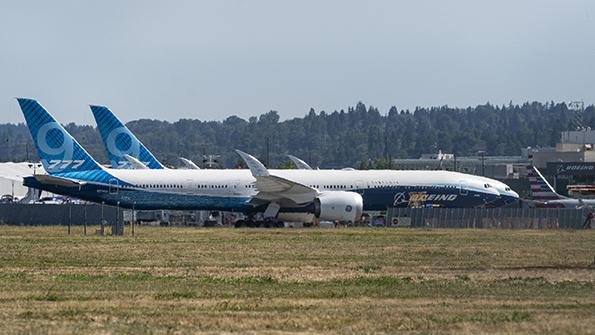
Is it conceivable that the Boeing 777X could be terminated?
Aviation Week Executive Editor for Commercial Aviation Jens Flottau responds:
Boeing currently has three widebody models in its portfolio: the 747-8, the 777X and the 787. While the 747-8 is being phased out, the 787 fleet is among the most active—even in the middle of the COVID-19 pandemic—because of the aircraft’s relatively small size and good efficiency. The 777X is in a much more difficult position, but it looks highly unlikely that Boeing would discontinue the program anytime soon.
Why? The certification campaign may be long and expensive, but most of the development money has already been spent. Following the termination of the 747, the 787-10 would become Boeing’s largest widebody, but it cannot compete with the Airbus A350 in terms of size and range. Continuing the legacy 777 is not an option, because its economics are inferior to that of the A350. With the 777X, Boeing has a tool in sales campaigns against the A350, and even if it lost most of the competitions, it would still inflict some pricing pain on Airbus.
The same argument is valid for the A330neo, which Airbus will not abandon in spite of its own weak sales, if only to keep Boeing disciplined on 787 pricing.
The 777X’s outlook, however, is problematic in today’s troubled aviation market. Boeing might decide to slow down the certification effort—which it has already done once for the smaller 777-8—allowing more time for the market to recover. And as the first Boeing aircraft to enter certification following the 737 MAX grounding, the 777X is guaranteed to receive deep scrutiny from key regulators.
The 777X’s backlog is dominated by Emirates Airline, Qatar Airways and Etihad Airways, which together hold about 240 of the 350 firm orders that Boeing has secured. But Emirates (with 156 firm orders, according to Boeing’s statistics) is gravitating toward the smaller 787 and the A350, which it might prefer as it rebuilds post-pandemic.
After Etihad had placed its orders, it reversed course and no longer has the ambition to compete with larger Gulf rivals on the same scale. Other 777X customers, such as Cathay Pacific, British Airways and Lufthansa, are in massive trouble, too, since many international markets remain closed and will likely recover much more slowly than domestic traffic.
Structurally, the 777X is more exposed because it is so large and heavy, geared toward thick long-haul streams that currently do not exist. Most observers agree that these routes will come back at some point, particularly in Asia, but the aircraft’s market potential looks to be more limited in Europe and North America. Remember: Airlines have grounded a lot of relatively young legacy 777s, and that could have an impact on sales of new aircraft in the short and medium term.





